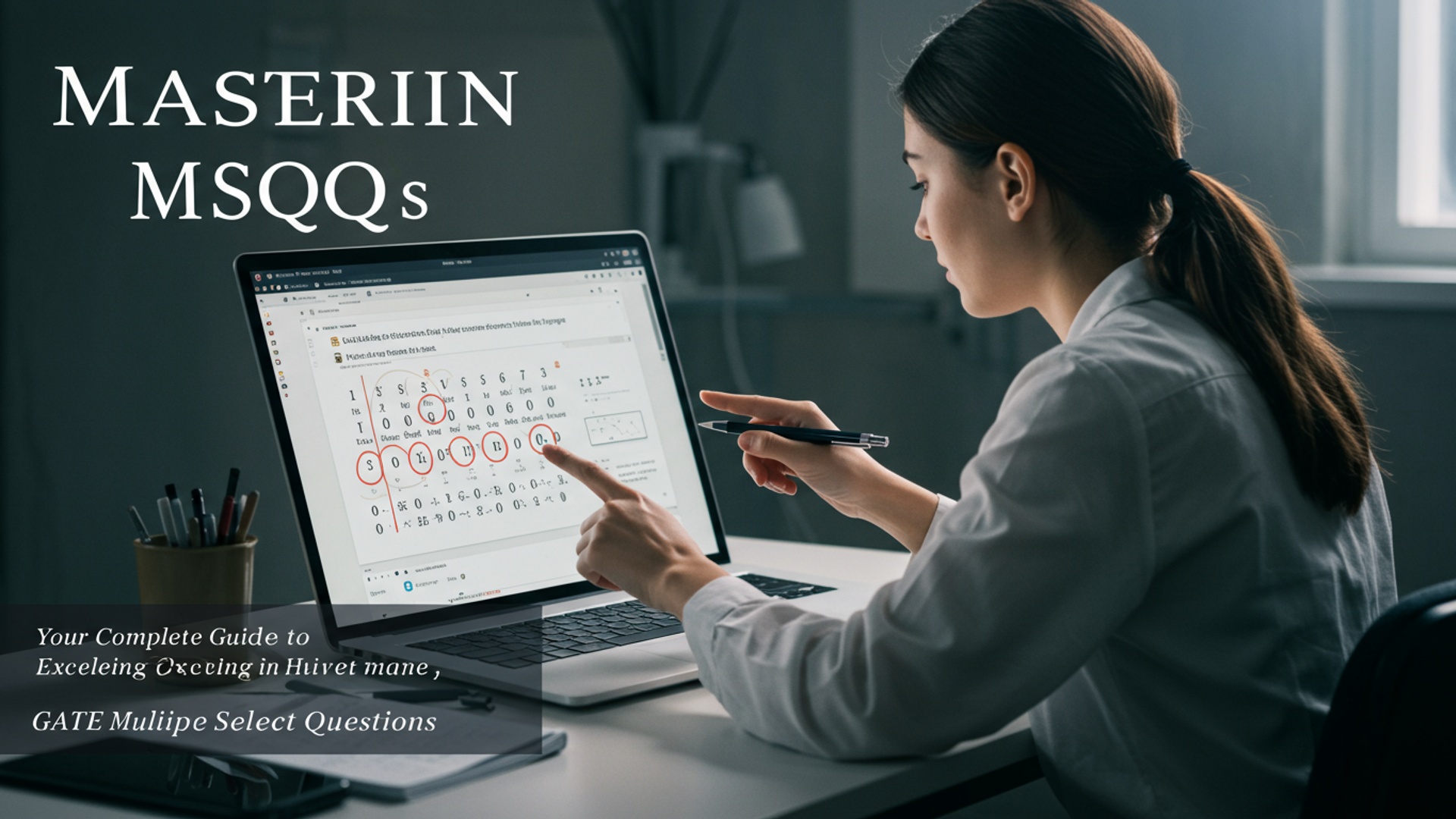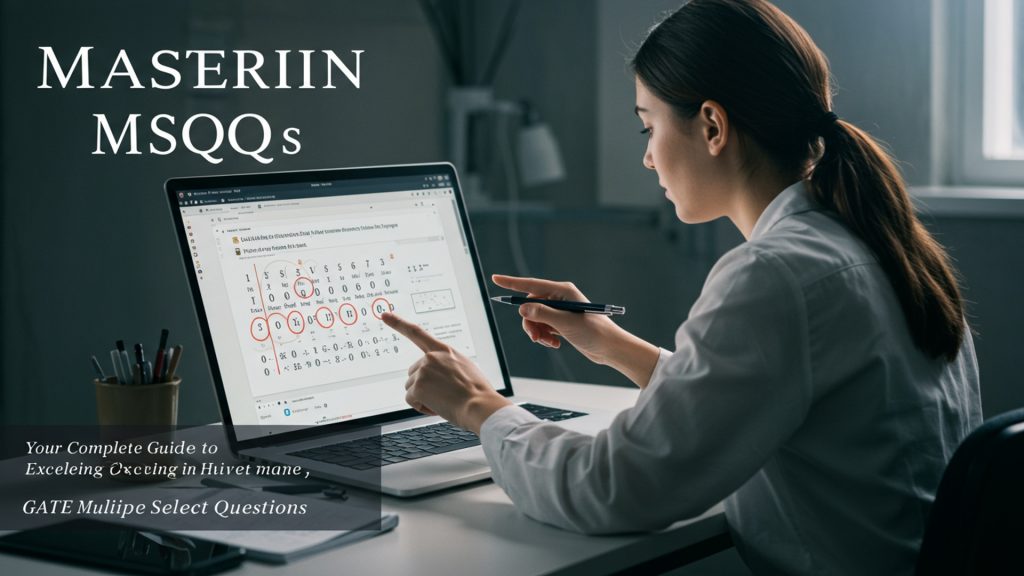The landscape of the Graduate Aptitude Test in Engineering (GATE) has fundamentally shifted, introducing Multiple Select Questions (MSQs) as a pivotal differentiator that transcends traditional Multiple Choice Questions. Unlike their single-correct counterparts, MSQs demand a comprehensive, nuanced understanding of GATE Exam Multiple Select Questions (MSQ) concepts, requiring candidates to identify all correct options from a set of four or more, often without the safety net of negative marking for incorrect selections but with zero marks for partially correct answers. This recent evolution, evident in subjects like Computer Science and Electrical Engineering where complex logical reasoning or multi-faceted problem-solving are tested, highlights MSQs as critical for top scores. Mastering these unique question types is no longer optional; it’s the direct pathway to unlocking peak performance and securing coveted ranks.

Understanding MSQs: The New Frontier in GATE
The Graduate Aptitude Test in Engineering (GATE) is a formidable hurdle for aspiring engineers. over the years, its structure has evolved to better assess a candidate’s comprehensive understanding. One of the most significant changes in recent times has been the introduction of Multiple Select Questions (MSQs). For many, Understanding GATE Exam Multiple Select Questions (MSQ) is crucial for success, as they represent a fundamental shift from the traditional Multiple Choice Questions (MCQs) and Numerical Answer Type (NAT) questions.
So, what exactly are MSQs? Unlike MCQs, where only one option among four is correct, MSQs can have one or more correct options among the given choices. This means that if a question has four options (A, B, C, D), it’s possible that only A is correct, or A and B are correct, or A, B. C are correct, or even all four (A, B, C, D) are correct. The key differentiator is that you must select all the correct options and only the correct options to score marks.
Why did GATE introduce MSQs? The primary reason was to move beyond rote learning and test a deeper, more holistic understanding of concepts. In MCQs, sometimes candidates could arrive at the answer through elimination or by only knowing a part of the concept. MSQs, But, demand a thorough grasp of the topic, requiring candidates to identify not just the single correct answer but every correct aspect and simultaneously rule out every incorrect one. This format also discourages blind guessing, as selecting even one incorrect option among correct ones, or missing a correct one, results in zero marks for that question.
Deconstructing the MSQ Format
When you encounter an MSQ in the GATE examination, its presentation will be similar to an MCQ. with a critical distinction. Instead of radio buttons (where only one option can be selected), you’ll typically see checkboxes next to each option. This visual cue immediately tells you that you can select multiple choices.
Let’s look at a hypothetical example of how options might appear:
Question: Which of the following are characteristics of an operating system? [ ] A. Resource management
[ ] B. Process scheduling
[ ] C. User interface
[ ] D. Application development
In this example, if A, B. C are correct, you would need to check all three boxes to get full marks. If you check A and B but miss C, or if you check A, B, C. D (where D is incorrect), you will receive zero marks for that question.
The marking scheme for MSQs is straightforward but unforgiving: you get full marks only if you select all the correct options and no incorrect options. Crucially, there is NO negative marking for MSQs. This is a significant relief compared to MCQs. it doesn’t mean you can guess wildly. While a wrong choice won’t deduct marks, it will still cost you the marks for that question if it’s part of an incorrect selection.
The Strategic Advantage of MSQs (and Their Pitfalls)
MSQs introduce a new layer of strategy to your GATE preparation and exam-day approach. Recognizing both their benefits and drawbacks is key to excelling.
Advantages:
- No Negative Marking: This is perhaps the biggest upside. Unlike MCQs, where a wrong answer can cost you 1/3rd or 2/3rd of the question’s marks, MSQs have no penalty for incorrect selections. This encourages candidates to attempt all MSQs for which they have some knowledge, as there’s no risk of losing marks you’ve already secured elsewhere.
- Tests Comprehensive Knowledge: MSQs are designed to probe your understanding deeply. You can’t just know an answer; you need to know all the answers and why the others are incorrect. This truly rewards candidates who have focused on conceptual clarity rather than just memorization.
- Rewards Deep Understanding: If you truly comprehend a topic inside out, MSQs can be high-scoring questions. They differentiate between superficial knowledge and profound grasp of the subject matter.
Pitfalls:
- All-or-Nothing Scoring: This is the flip side of no negative marking. Even if you identify 3 out of 4 correct options but miss one, or if you select one incorrect option along with all correct ones, you score zero. This demands precision.
- Requires Careful Analysis of Every Option: You cannot afford to quickly scan options and pick one. Each option needs to be individually verified against the question and your knowledge base. This can be time-consuming.
- Time-Consuming if Not Approached Strategically: Because of the detailed analysis required for each option, MSQs can consume more time than MCQs. Efficient time management is critical to avoid getting stuck on a single question.
Mastering the Art of Solving MSQs: A Step-by-Step Approach
Solving MSQs effectively requires a systematic approach that leverages your knowledge and minimizes errors. Here’s a step-by-step guide:
Step 1: Read the Question Meticulously
Before even looking at the options, ensure you fully comprehend what the question is asking. Identify keywords, constraints. the core concept being tested. For instance, is it asking for “advantages,” “disadvantages,” “true statements,” or “false statements”? A common mistake is misinterpreting the question and then evaluating options incorrectly.
Step 2: Evaluate Each Option Independently
This is the most crucial step for Understanding GATE Exam Multiple Select Questions (MSQ). Treat each option (A, B, C, D, etc.) as an individual True/False statement related to the question. Don’t compare options to each other initially. Focus solely on whether Option A is true or false based on the question, then move to Option B. so on.
Step 3: Leverage Your Core Knowledge
Apply your fundamental concepts, theorems, formulas. definitions. If an option states a fact, verify it against your established knowledge. If it describes a process, mentally walk through that process. This is where your deep preparation pays off.
Step 4: The Process of Elimination (with a Twist)
While MSQs don’t allow elimination in the same way as MCQs (where eliminating three wrong answers directly gives you the one right one), you can still use it to your advantage. As you evaluate each option independently, clearly mark whether it is “Definitely True,” “Definitely False,” or “Uncertain.” If you identify an option as “Definitely False,” you can immediately deselect it and move on. This helps narrow down the possibilities and focus your attention on the remaining ones.
Step 5: Double-Check and Verify
Once you’ve made your selections, take a moment to re-read the question and review all the options you’ve chosen. Ask yourself:
- Have I selected all the correct options?
- Have I selected any incorrect options?
- Are there any subtle nuances in the question or options that I might have missed?
This final verification step can save you from careless errors.
Real-World Example Walkthrough:
Let’s consider an MSQ from the Computer Science domain:
Question: Which of the following statements are true regarding the TCP protocol? [ ] A. It provides reliable, connection-oriented communication. [ ] B. It uses UDP for congestion control. [ ] C. It employs a three-way handshake for connection establishment. [ ] D. It is a stateless protocol. Applying the Steps:
- Step 1 (Read Meticulously): The question asks for true statements about TCP.
- Step 2 & 3 (Evaluate Independently & Leverage Knowledge):
- Option A: “It provides reliable, connection-oriented communication.” – Based on networking fundamentals, TCP is indeed reliable (guaranteed delivery) and connection-oriented (requires setup and teardown). So, A is True.
- Option B: “It uses UDP for congestion control.” – This is fundamentally incorrect. TCP has its own sophisticated congestion control mechanisms (e. g. , slow start, congestion avoidance, fast retransmit, fast recovery). UDP is a connectionless, unreliable protocol and has nothing to do with TCP’s congestion control. So, B is False.
- Option C: “It employs a three-way handshake for connection establishment.” – This is a classic characteristic of TCP to establish a connection (SYN, SYN-ACK, ACK). So, C is True.
- Option D: “It is a stateless protocol.” – TCP maintains state details (sequence numbers, acknowledgment numbers, window sizes) throughout the connection lifecycle. UDP is stateless. TCP is not. So, D is False.
- Step 4 (Elimination): We’ve identified B and D as False.
- Step 5 (Double-Check): We are left with A and C. Both are definitively true based on our understanding of TCP. Therefore, we would select options A and C.
Preparation Strategies Tailored for MSQs
Since MSQs demand a deeper understanding, your preparation strategy needs to adapt accordingly.
- Focus on Conceptual Clarity: This cannot be stressed enough. Instead of memorizing facts, comprehend the underlying principles, the “why” behind every concept. For example, don’t just know that TCP is reliable; comprehend how it achieves reliability (sequence numbers, acknowledgments, retransmissions, timeouts).
- Practice with MSQ-Specific Resources: While previous year’s GATE papers might not have a large number of MSQs, many coaching institutes and online platforms now provide mock tests specifically designed with MSQs. Utilize these to get comfortable with the format and the depth of questions.
- Systematic Revision: Create detailed, interconnected notes. Use flowcharts, mind maps. summary tables that link different concepts. This helps in seeing the bigger picture and identifying all relevant aspects for an MSQ.
- Error Analysis: After attempting mock MSQs, don’t just look at the score. assess why you got a question wrong. Was it a conceptual gap? Did you misinterpret the question? Did you overlook an option? Was it a simple calculation error? Pinpointing the source of error helps in targeted improvement.
- Time Management: Practice solving MSQs within a time limit. They often require more thought per question. Develop a sense of how much time to allocate to them, ensuring you don’t neglect other sections.
- Mock Test Simulation: Simulate exam conditions as closely as possible. This includes using the virtual calculator, navigating the online interface. managing your time across different question types (MCQ, MSQ, NAT).
Comparison: MSQs vs. MCQs vs. NATs
To further solidify your Understanding GATE Exam Multiple Select Questions (MSQ), let’s compare them directly with their counterparts:
| Feature | Multiple Select Questions (MSQ) | Multiple Choice Questions (MCQ) | Numerical Answer Type (NAT) |
|---|---|---|---|
| Number of Correct Options | One or more | Exactly one | A numerical value (no options) |
| Negative Marking | No | Yes (for incorrect answers) | No |
| Partial Credit | No (all or nothing) | No | No |
| Answer Format | Checkboxes (select one or more) | Radio buttons (select one) | Text box (type numerical value) |
| Skills Tested | Comprehensive understanding, precision, ability to identify all correct and incorrect facts. | Recall, basic application, ability to select the best fit from given options. | Problem-solving, calculation, accuracy of numerical computation. |
| Example Goal | “Identify ALL true properties of X.” | “Which of the following is the correct definition of Y?” | “Calculate the value of Z.” |
Expert Tips and Common Pitfalls to Avoid
Seasoned GATE aspirants and educators often share valuable insights that can make a significant difference in tackling MSQs.
Expert Tips:
- Prioritize Confidence: While there’s no negative marking, remember it’s still an all-or-nothing game. If you’re highly confident about all options in an MSQ, tackle it first. If you’re unsure about even one option, mark it for review and come back if time permits after attempting more certain questions.
- Leverage Virtual Calculator Efficiently: For quantitative MSQs, ensure you’re adept at using the on-screen virtual calculator. Practice calculations to avoid errors that could lead to selecting an incorrect option.
- Don’t Overthink Simple Options: Sometimes, one or more options in an MSQ might be deceptively simple or obviously true/false. Don’t second-guess yourself on these; trust your fundamental knowledge.
- Timeboxing: If you find yourself spending too much time on a single MSQ, set a mental timer. If you haven’t made significant progress within, say, 2-3 minutes, mark it for review and move on. You can always return to it later.
Common Pitfalls to Avoid:
- Treating Them Like MCQs: The most common mistake is assuming there’s only one correct answer. Always remember the checkbox format means multiple selections are possible.
- Rushing Through Options: Each option in an MSQ is a potential trap or a critical piece of insights. Rushing can lead to missing subtle keywords or misinterpreting statements.
- Overlooking Subtle Details: MSQs often test your attention to detail. A single word like “always,” “never,” “only,” or “except” can change the truth value of an option. Read carefully.
- Not Evaluating Every Option: Even if you’ve found two correct options, always evaluate the remaining ones. You might find a third correct option, or confirm that the remaining ones are indeed false. Failing to check all options is a guaranteed way to miss marks.
- Guessing Without Any Basis: While there’s no negative marking, randomly guessing on MSQs is a low-probability strategy for success. The chances of selecting all correct options without any knowledge are extremely slim. Focus on questions where you have a reasonable understanding.
Conclusion
Mastering MSQs transcends mere memorization; it demands a nuanced understanding and a strategic approach. As the GATE exam continues to evolve, with recent papers like GATE 2024 increasingly featuring complex, multi-faceted questions, a deeper conceptual grasp becomes paramount. I’ve personally found that the key lies in treating each option not as a simple choice. as an independent assertion requiring individual verification. This meticulous process, akin to solving a series of true/false statements, ensures you don’t overlook subtly correct or incorrect alternatives. Embrace this “verify-all” methodology. For instance, in a question involving multiple physical principles, don’t just pick the first option that seems right; assess why others might also apply, or why they are definitively wrong, considering every nuance. This holistic approach builds resilience and precision. Remember, consistent practice, not just in solving. in analyzing your errors, is your most potent tool. With dedication to this refined strategy, you won’t just navigate MSQs; you’ll conquer them, transforming your GATE preparation into a truly comprehensive learning journey.
More Articles
Leading Engineering Colleges in Germany: A Practical Guide for International Students
Balancing Act: The Environmental Risks and Rewards of Genetic Engineering Explored
Green Genes: How Genetic Engineering is Revolutionizing Environmental Solutions and Sustainability
From Lab to Leadership: Unexpected and Lucrative Career Opportunities in Biotechnology
Unlocking the Future: A Simple Guide to What Biotechnology Truly Means Today
FAQs
What exactly are MSQs in GATE. why should I care about them?
MSQs, or Multiple Select Questions, are a specific type of question in the GATE exam where one or more of the given options can be correct. Unlike MCQs where only one option is right, you need to select all the correct ones to get full marks. They’re crucial because they test your deeper understanding of a topic, not just rote memorization. they don’t have negative marking, making them a high-reward area if you master them.
How will ‘Mastering MSQs’ help me improve my GATE score?
This guide breaks down the unique challenges of MSQs, providing you with targeted strategies to approach them effectively. You’ll learn how to identify all correct options, avoid common pitfalls. develop the critical thinking skills necessary to tackle complex problems where multiple answers might seem plausible. It’s designed to turn MSQs from a potential stumbling block into a scoring opportunity.
Is this guide suitable for all GATE aspirants, regardless of their engineering discipline?
Absolutely! While the examples might sometimes be from common engineering concepts, the core strategies, analytical approaches. problem-solving techniques taught in ‘Mastering MSQs’ are universally applicable across all GATE disciplines. The principles of dissecting questions and evaluating multiple options remain the same whether you’re studying Electrical, Mechanical, Civil, or Computer Science engineering.
I’m already comfortable with regular MCQs. Do I really need a separate guide just for MSQs?
Yes, you probably do! MSQs require a different mindset than standard MCQs. Being good at MCQs means you can often pinpoint the single best answer. With MSQs, you need to evaluate every option independently and identify all valid ones. This guide specifically addresses that shift in approach, teaching you how to avoid partial credit traps and ensure you select all the correct choices for full marks.
What specific strategies or techniques will I learn from this guide?
You’ll discover a range of effective techniques, including systematic option evaluation, elimination strategies tailored for multiple correct answers, common distracter identification. how to apply fundamental concepts to validate each choice. The guide also emphasizes time management within MSQ sections and building confidence to tackle these often-tricky questions.
Does the guide include practice questions, or is it purely theoretical?
It’s a comprehensive mix! While ‘Mastering MSQs’ provides a solid theoretical foundation on how to approach these questions, it’s heavily fortified with practical examples and dedicated practice sets. You’ll get hands-on experience applying the learned strategies to various types of MSQs, ensuring you’re well-prepared for the actual GATE exam.


